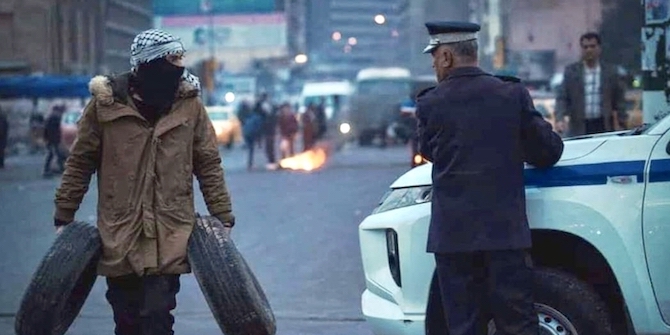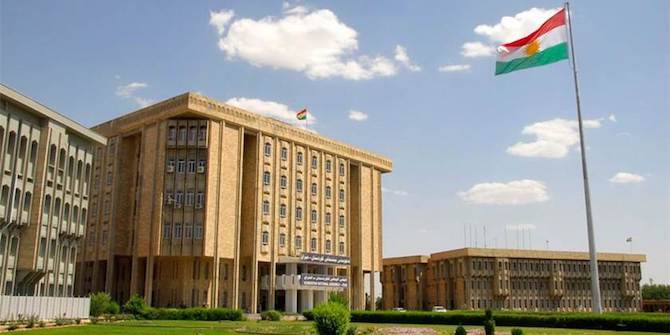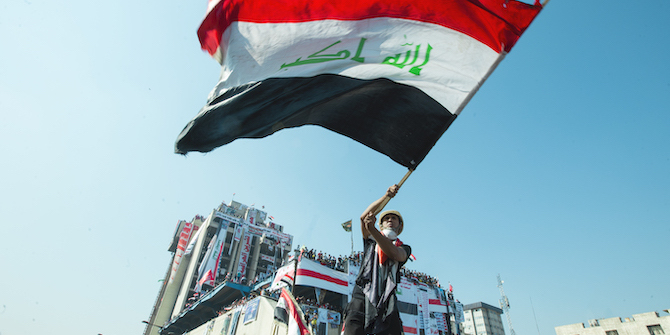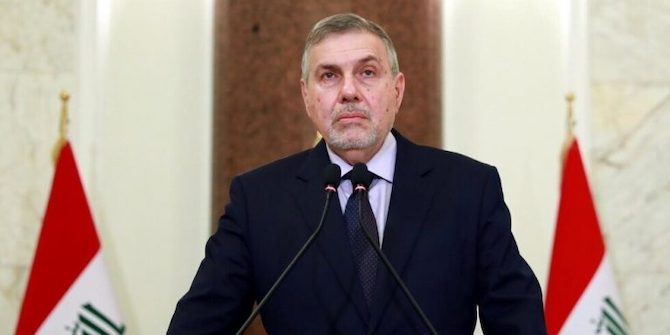by Simona Foltyn

Earlier this year, a delegation from Iraq’s western Sunni province of Anbar paid a visit to an influential Shi’a powerbroker in Baghdad. The group included government officials, sheikhs, activists, journalists and ordinary citizens, brought together by a shared objective: to dislodge the most powerful Sunni politician, Mohammed al-Halbousi, who has served as Iraq’s speaker of parliament since 2018. They group appealed for the support from the ruling Shi’a coalition to hatch a plan to erode Halbousi’s power base and eventually remove him from office.
The visit highlights brewing discontent in Anbar – Halbousi’s home province – and more broadly among Iraq’s Sunni population. Though there are no opinion polls, a swelling chorus of voices accuses Halbousi of rampant corruption and authoritarianism. Efforts to challenge Halbousi have intensified over recent months and are expected to culminate after parliament passed a three-year budget last week, for which prime minister Mohammed al-Sudani required the speaker’s support. In the meantime, a new political alliance, called Tahaluf Anbar, is mobilising and plans to contest Halbousi’s Taqqadum party in provincial elections currently slated for end of 2023.
As these tensions come to a head, a forthcoming PeaceRep paper for the LSE Middle East Center sheds light on Halbousi’s extraordinary trajectory, examining the reasons for mounting discontent and the implications for stability and representation in Sunni areas.
Halbousi has enjoyed a stellar rise to power, defying some norms that have governed Sunni politics. In the span of only four years, the former US contractor rose from member of parliament to governor of Anbar province to speaker of parliament, the most powerful Sunni position in Shi’a-majority Iraq. This stands in stark contradiction to the weight of his tribe, which ranks among the least influential in Anbar.
Initially, many of the Sunni leaders who now demand Halbousi’s removal endorsed him, citing hopes he’d represent a new generation of liberal, technocratic leaders. But his striking ascent was soon overshadowed by the reputation of a cunning and ruthless politician who was quick to make and break promises in pursuit of power. He is said to have turned on backers and opponents alike, earning him labels such as ‘Satan on earth’ and ‘the new Saddam.’ His supporters – and they remain many – have dismissed such criticism as natural rivalry borne of his success.
So how has Halbousi, aged only 42 and hailing from a small tribe, managed to build such a formidable political (and economic) empire in a relatively short time?
By most accounts, timing was crucial. ‘He benefited from two crises,’ said one of three dozen sheikhs, politicians and officials interviewed for the forthcoming paper. When Halbousi began his political career in 2014, ISIS had devastated Sunni areas, displaced millions and incapacitated existing leadership structures. Anbar’s major cities were the first to be liberated, opening the floodgates for international aid. The completion of hundreds of UN projects allowed Halbousi, then governor, to position himself as the champion of Anbar’s reconstruction.
A second crisis played into the speaker’s hands a year into his tenure, when mass protests swept through Iraq’s south, distracting Shi’a ruling elites and shaking the central government. Halbousi benefited from the weakness of two successive prime ministers, extending his authority deep into the executive branch. Prime Minister Mustafa al-Kadhimi, in particular, gave Halbousi free rein to tighten his grip over Anbar’s local institutions by controlling appointments for the institutions like the police, the intelligence and the election commission. Under Halbousi’s leadership, parliament voted to dissolve provincial councils in 2019, eliminating local oversight. His close ties with the head of Iraq’s judiciary are perceived to have provided additional cover.
The result is what some describe as ‘one party rule’ in Anbar, with Halbousi deploying an effective combination of ‘money and force’ to consolidate his grip over institutions. Service provision, appointments, even success in elections have become contingent on political support, his critics lament. Halbousi and his party stand accused of selling public and tribal land for profit, embezzling funds intended for pensioners and martyrs while funnelling lucrative contracts to companies owned by relatives and loyalists in return for kickbacks. Halbousi’s allies, however, say this all constitutes fair play. ‘If I was him, I would have gone even further,’ said one local Anbar official aligned with Halbousi.
But interviews suggest that the current tensions are more than just politics. There has been a growing backlash to what many perceive as a systemic attempt to suppress freedom of speech and quell opposition. Several tribal sheikhs interviewed for this research have been slapped with arrest warrants, while activists and citizens critical of authorities face threats or police harassment. This has alienated many of Anbar’s local leaders, who feel he is treading on the principles of power-sharing that govern this tribal society, a transgression that is seen as particularly offensive in light of Halbousi’s young age and his tribe’s inferior standing.
It is thus unsurprising that tribes are at the heart of galvanising opposition to Halbousi, alongside veteran politicians like former Finance Minister Rafi al-Essawi and Halbousi’s very first sponsor-turned-adversary, Jamal al-Karbouli. In tribal meetings across Sunni provinces, elders are pre-selecting candidates to avoid unnecessary internal competition as they face Taqqadum in forthcoming provincial elections. Tribal leaders look to a strong central government led by Prime Minister Sudani, who has begun to claw back some of the executive powers, to ensure the vote is free and fair. Though widespread popular protests are unlikely amid fears they could be hijacked by extremists or crushed by authorities, as was the case in 2013, tribal conflict could become a source of instability if issues of representation aren’t resolved.
On the national level, there has been a steady trickle of defections from Halbousi’s Taqqadum to rival Sunni parties amid a growing sense that Halbousi has failed in his capacity as speaker to represent Sunni interests. ‘He is behaving like a party boss, not like a leader of the Sunnis,’ said one former speaker. Key Sunni interests include a general pardon for supposedly innocent Sunnis languishing in prisons, the abolition of the justice and accountability (de-Baathification) committee, justice for Sunnis disappeared during the war against ISIS and the return of Sunnis to areas now under control of Shi’a armed groups. Halbousi’s detractors say he merely uses these sensitive issues to extract concessions and secure support from his Shi’a backers. ‘He agreed with the Shi’a, promising he would bring the Sunnis as a flock of sheep,’ said one member of parliament.
But there are signs that Shi’a elites have grown weary of Halbousi, which could mark his downfall. When Halbousi first rose to power, he earned the favor of late Shi’a paramilitary boss Abu Mahdi al-Mohandis and Iranian General Qasem Suleimani by pledging to protect Shi’a interests such as allowing Iran-aligned Shi’a armed groups who had participated in the war against ISIS to use the strategically located province of Anbar as a corridor between Iran and Syria. Now, many Shi’a politicians feel Halbousi is too unreliable a partner. His decision last year to try to form a tripartite ruling alliance with Moqtada al-Sadr and Massoud Barzani was a red flag the Coordination Framework saw as an attempt to undermine Shi’a majority rule. Unless Halbousi strikes a new deal that ensures his survival, his extraordinary rise as the most powerful Sunni politician in post-Saddam Hussein Iraq could be nearing the end.
[To read more on this and everything Middle East, the LSE Middle East Centre Library is now open for browsing and borrowing for LSE students and staff. For more information, please visit the MEC Library page.]






